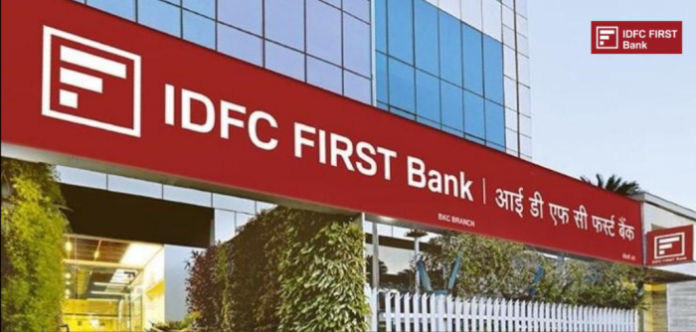Chennai, May 22, 2020 : Financial results at a glance The Board of Directors of IDFC FIRST Bank, the bank created by the merger of IDFC Bank and Capital First recently, in its meeting held today, approved the combined audited financial results for the quarter and the year ended 31 March 2020, as summarized below.
Earnings
The Profit after Tax for Q4 FY20 is reported at Rs. 72 crores as compared to Loss of Rs. 218 crores for Q4 FY19.
Q4 FY20 Net Interest Income (NII) grew 40% Y-o-Y to Rs. 1,563 crores, up from Rs. 1,113 crores in Q4 FY19.
Net Interest Margin (quarterly annualized) rose to 4.24% in Q4 FY20 from 3.03% in Q4 FY19.
Fee and Other Income (without trading gains) increased 40% to Rs. 432 Crores in Q4 FY20 as compared to Rs. 310 crores in Q4-FY19. Total Fee Income for Q4 FY20 is 22% of the Total Income (net of Interest Expenses and Trading gain). The trading gain for Q4-FY20 was at Rs. 319 crores.
Total Income (net of Interest Expense) grew by 67% at Rs. 2,314 crores for Q4-FY20 as compared to Rs. 1,386 crores for Q4-FY19.
Pre-Provisioning Profit (PPOP) increased to Rs. 787 crores in Q4 FY20 compared to Rs. 239 crores in Q4 FY19.
Without the trading gain, PPOP increased by 70% on YOY basis from Rs. 275 crores in Q4-FY19 to Rs. 464 crores in Q4-FY20.
The provision for Q4-FY20 was at Rs. 679 crores which included Rs. 225 crores of COVID-19 related provision. The Bank was required to make COVID-19 related provision of Rs. 25 crore pertaining to accounts where asset classification benefit was given. The bank has provided the entire amount in Q4-FY20 itself. The bank additionally took Rs. 200 crores of COVID-19 related provisioning proactively for over-dues of 1-89 days taking total COVID provisions to Rs. 225 cr. Retail provisions for the quarter was Rs. 349 crores.
Liabilities – Strong and Steady growth
CASA Deposits posted strong growth, rising 162% YoY to Rs. 20,661 crores as on 31 March 2020 as compared to Rs. 7,893 crores as on 31 March 2019.
CASA Ratio improved to 31.87% as on 31 March 2020 as compared to 11.40% as on 31 March 2019.
Core Deposits (Retail CASA and Retail Term Deposits) increased 157% to Rs. 33,924 crores Q4 FY20 from 13,214 crores in Q4 FY19. This signifies the sticky and sustainable nature of the growing deposit balance.
The Fixed Deposits of the Bank has been assigned the highest rating “FAAA/Stable” by CRISIL.
The Bank has reduced its dependence on the wholesale and market borrowings which have been suitably replaced by the growth of core Retail Deposits. The borrowing through Certificate of Deposits (CD) of the Bank has reduced by 75% on YOY basis to Rs. 7,111 crores as on 31 March 2020 from Rs. 28,754 crores as of 31 March 2019.
Loans and Advances – stable with growing retail %
Total Funded Loan Assets, gross of Inter-Bank Participation Certificates (IBPC), stood at Rs. 1,07,004 crores for Q4 FY20, compared to Rs. 1,10,400 crores for Q4 FY19. As the stated strategy the Bank focused on growing the retail loan book and decreased the wholesale loan book including infrastructure loans to reduce concentration risk on the portfolio.
Out of the total book mentioned above, Retail Loan Book increased by 40% to Rs. 57,310 crores as on 31 March 2020, compared to Rs. 40,812 crores as on 31 March 2019.
The Bank also acquired inorganic portfolio buyouts, primarily to cater to the PSL requirements where the underlying assets are retail loans. Retail loans including such inorganic portfolio constitute 61% of the overall loan assets.
Wholesale Loan Book, including Security receipts and Loans converted to equity reduced by 26% from Rs. 56,665 crores as of 31 March 2019 to Rs. 41,739 crores as of 31 march 2020 as the Large corporate loans and infrastructure loans continue to decline steadily as per the stated objective.
Within the wholesale segment as stated above, the Infrastructure loan book reduced by 31% to Rs. 14,840 crores Q4 FY20 from Rs. 21,459 crores Q4 FY19.
Asset Quality
Gross NPA of the Bank reduced to 2.60% as of March 31, 2020, as compared to 2.83% as of December 31, 2019.
Net NPA was 0.94% as of March 31, 2020, as compared to 1.23% as of December 31, 2019.
The Gross NPA and Net NPA for the Bank without considering the moratorium impact would have been 2.88% and 1.14% respectively.
As of 31 March 2020, after considering the moratorium impact, the Gross NPA % of the Retail Loan Book was at 1.77% as compared to 2.26% as of 31 December 2019 and Net NPA % of the Retail Loan Book of the Bank was at 0.67% as compared to 1.06% as of 31 December 2019.
Without the moratorium, the Gross NPA and Net NPA of Retail Assets as of 31 March 2020 would have been 2.22% and 0.99% as compared to 2.26% and 1.06% as of 31 December 2019.
Apart from the NPA, the identified stressed asset pool of the bank, reduced by Rs. 933 crores during the last financial year. This stressed pool stood at Rs. 3,205 crores as of 31 March 2020 against which the Bank has done provisioning of Rs. 1,569 crores, 49% of the pool.
Apart from the accounts mentioned in the previous slide, the Bank had also marked one large telecom account as stressed and provisioned 50% against the total outstanding of Rs. 3,244 crores (Funded – Rs. 2,000 crores and Non-Funded – Rs. 1,244 crores) in the quarter ending on 31 December 2019. The Bank continues to carry the same provision for the account as of 31 March 2020.
COVID-19 situation
Like the entire country and the overall economy, the Bank is also encountering the challenges due to the COVID-19 Pandemic situation and the related lock-downs across the country.
As essential services, the Bank continues to service its customers in all possible ways emphasizing on technology driven solutions. The branches of the Bank have remained open during this emergency time and the employees have efficiently helped their customers for all their needs in this situation, while remaining under the guidelines as prescribed by the Government Authorities.
Moratorium has been provided to 35% of the outstanding book based on the customer requests as received and granted following the notifications by the RBI. Further, the Bank has provided 100% moratorium on suo-moto basis to select segments like rural financing.
The Bank was required to make COVID-19 related provision of Rs. 25 crore pertaining to accounts where asset classification benefit was given. The bank has provided the entire amount in Q4-FY20 itself and has additionally taken Rs. 200 crores of COVID-19 related provisioning proactively for over-dues of 1-89 days taking total COVID provisions to Rs. 225 cr.
Although the incremental disbursals on the retail loan book have been sluggish during the lockdown period, the Bank continues to grow its retail deposits. We expect the retail loan book growth will gradually resume post the lock-down restrictions are likely to be lifted in a phased manner.
In this situation, the Bank continues to focus on its technology interventions and efficiency improvements for which it has taken several steps including the cost rationalization.
Capital Position
As of March 31 2020, the Net Worth of the Bank was Rs. 15,343 crores and the Book Value per share was Rs. 31.90.
Capital Adequacy of the Bank is strong at 13.38% with CET-1 Ratio at 13.30% as of 31 March 2020 as compared to Capital Adequacy Ratio of 13.29% and CET-1 Ratio of 13.28% as of 31 December 2019.
The Bank has announced raising Rs. 2,000 crore of fresh equity capital through preferential route, process to complete by June 2nd week.
Post the completion of the process, the Capital Adequacy Ratio based on 31 March 2020 will be 15.55% with CET-1 Ratio of 15.32%.
Mr. V Vaidyanathan, Managing Director and CEO, IDFC FIRST Bank, said, “We are happy to inform that deposits for our Bank are coming thick and strong. In Q4 FY20, we saw strong inflows into our Bank as retail deposits increased by Rs 4,658 crore, despite the turmoil in the markets. Once the lockdown lifts, things will only get better for both lending as well as deposits as the economic activity will pick up. We are already seeing this that where locations are opening up from lockdown, demand is strong. Further by raising Rs. 2,000 crore of fresh equity capital, and reaching strong capital adequacy of 15.5%, the Bank is in a strong position to grow from here on.”
Corporate Comm India(CCI Newswire)
































